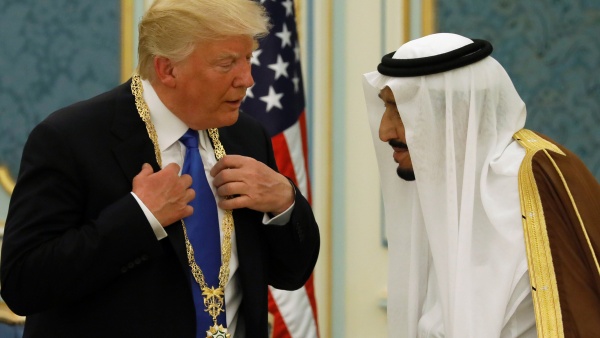US, Saudi Arabia Pursuing New Plot in Iraq
TEHRAN (Basirat): In TRUMP‘s Middle East policy, he has given so much credit to Saudi Arabia. And this credit is given because of the way that Trump views Saudi coffers. In fact, Trump seeks to achieve his goals in the region with Saudi money,
MOHAMMAD REZA MORADI
Basirat Political Center

In his Middle East policy, Trump has given so much credit to Saudi Arabia. And this credit is given because of the way that Trump views Saudi coffers. In fact, Trump seeks to achieve his goals in the region with Saudi money. Among the objectives of Tillerson’s visit is to lay the groundwork to forge closer relations between Baghdad and Riyadh, and set the stage for increasing Riyadh’s influence in Baghdad. So, by travelling to Riyadh and participating in the first meeting of the Saudi-Iraqi Coordination Council, Tillerson sought to find words to "ameliorate relations between the two countries.” By seeking to improve ties between Riyadh and Baghdad, Tillerson is said to be trying to diminish Iran’s growing influence in Iraq. According to Fox News, the alliance between Saudi Arabia and Iraq can decrease Iran’s growing leverage, from the Persian Gulf to the Mediterranean Sea. The al-Akhbar newspaper has also underlined that although Tillerson’s trip to Saudi Arabia and Qatar was basically aimed at discussing the crisis between the two countries and settling the dispute, the issue of countering Iran’s influence took precedence over the Saudi-Qatari crisis due to Trump’s approaches.
Of course, ground had been prepared for the amelioration of relations between Saudi Arabia and Iraq months ago. Saudi Foreign Minister Adel al-Jubeir and his entourage travelled to Iraq in early 2017 after 14 years and just weeks after Donald Trump took office as US President. It was the first trip to Iraq by a senior Saudi diplomat since 2003. He described Saudi Arabia and Iraq as two parts of the same body and promised to help both countries develop extensive economic and security cooperation. This was a very important issue, and now the two countries have set up a coordination council. What counts is that Saudi Arabia seeks to contribute to the reconstruction of Iraq with US support. This could trigger Saudi Arabia’s influence in Iraq’s Sunni-populated areas, which are extremely prone to tension and crisis. In fact, Washington seeks to reinforce the status of Saudi Arabia in Iraq in order to create a kind of counterbalance against Iran’s influence in Iraq. The White House still claims Iran has managed to dominate Iraq despite the US-led invasion of Iraq in 2003 and spending billions of dollars to wipe out Saddam Hussein. So, the US believes Iran’s influence should be tackled.
On the other hand, Tillerson travelled to the region and tried a lot to resolve the crisis between Qatar and Saudi Arabia and, as a result, set the stage for Doha to distance itself from Tehran. Of course, he failed to achieve this objective. Overall, Tillerson’s visit to the Middle East was an attempt to carry out Trump’s threats against Iran. However, there are indications that these efforts have failed because Tillerson tried hard in his meeting with Abadi to sideline the Popular Mobilization Units, but the Iraqi premier’s unflinching support thwarted Tillerson’s scheme. The United States has claimed time and again that the Popular Mobilization Units is affiliated with Iran and should be marginalized.
















